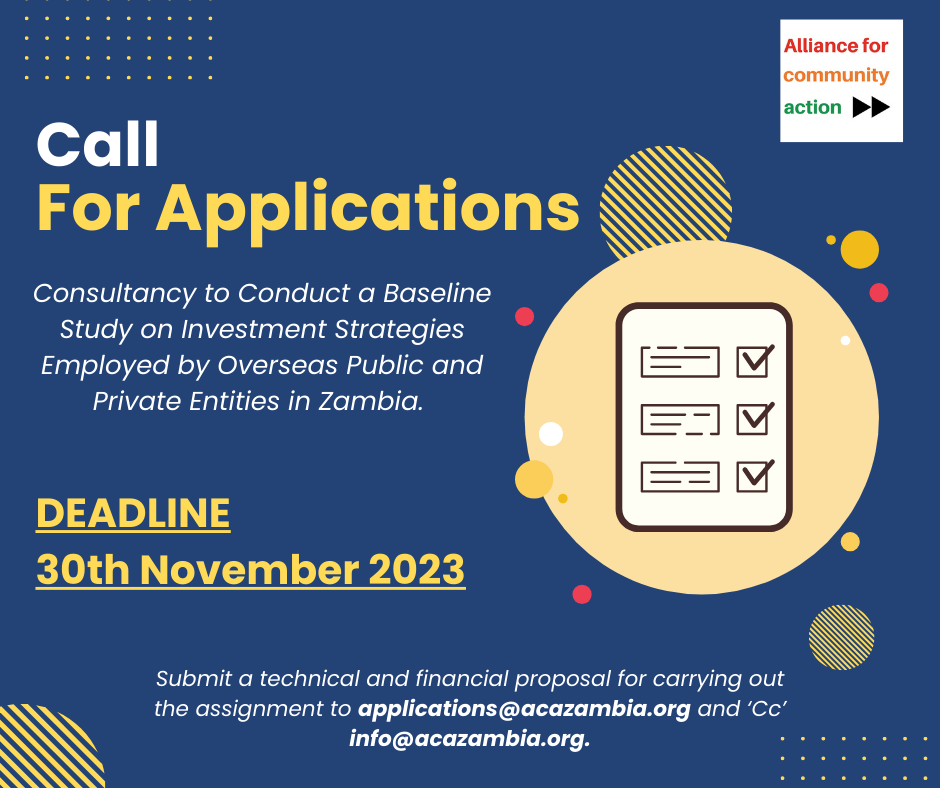
INTRODUCTION
The Alliance for Community Action (ACA) is a non-governmental organisation set up in 2013 and works towards the articulated vision of “a Zambia in which all her citizens enjoy the full and equitable benefit of all her resources”. The ACA works to grow the routine and systematic demand for public resource accountability in Zambia, with the specific aim of instituting that demand in the general public. The ACA adopts a broad view of what constitutes the public resource to include nonfinancial aspects such as the nation’s democracy, institutions of democracy, constitutionalism, and the citizenry, whose interest and advancement financial resources serve.
- BACKGROUND TO THE CONSULTANCY
The positive transformation of Zambia’s democratic landscape has led to a notable surge in investments across the nation. It is, therefore, crucial to approach the envisaged increase in investments with caution to ensure that Zambia realises maximum benefits through the evaluation of these investments. It is particularly necessary to focus on aspects related to economic and climate justice. There is a need for the implementation of sustainable and inclusive investment practices in Zambia, ensuring that the benefits are widespread and environmentally responsible. Zambia is also highly vulnerable to the impacts of climate change, such as droughts, floods, and unpredictable rainfall patterns. Climate change, therefore, exacerbates existing challenges like food insecurity, water scarcity, and population displacement. Tackling climate change and promoting climate justice is crucial for sustainable development and reducing vulnerability. Another pressing concern is the responsible management of natural resources, particularly in the mining and timber extractive sectors, which have faced criticism for environmental degradation, social inequality, and inadequate benefit-sharing mechanisms. Ensuring equitable and sustainable resource management is essential for both economic and climate justice. - There is a great need to analyse any legislation which could pose a direct threat to this aspiration by ensuring that weak and fragmented legislation is changed to create and enforce a strong legal and policy framework that protects life and the environment. Key to this is the Environmental Management Act and supporting legislation which together are considered to be insufficient in advancing Zambia’s climate change mitigation aspirations and stopping environmental degradation. Specifically, poor citizen involvement in decision-making, weak environmental impact assessment assessments and subjugation of environmental risks to economic benefits are some of the issues seen as negating the fight for better environmental protection and by extension climate justice.
Despite the weak legislative framework, the Zambian government has identified several policy priorities to address economic and climate justice. These include promoting renewable energy sources, building climate resilience in agriculture, improving access to education and healthcare, fostering inclusive economic growth, and diversifying the economy beyond copper mining. Zambia has also after 2021 created a dedicated Ministry of Green Economy which shows political commitment to mitigating risks posed by climate change. However, the ministry needs to be backed with stronger and streamlined legislative authority. The government has also engaged in partnerships with international organizations, donor countries, and civil society groups to mobilize financial resources, technical expertise, and knowledge sharing to support sustainable development initiatives.- MAIN OBJECTIVE
Given the aforementioned, the ACA now wishes to commission a study to examine the investment strategies employed by overseas public and private entities in Zambia, with a specific focus on the Eastern, Central, Luapula, and Lusaka provinces in the past 5 years (2018-2022).
The findings of this study shall be used to inform activities and other interventions in an initiative whose aim is to encourage overseas economic actors active in Zambia to fulfil green and inclusive investment commitments and promote new green financing and other policy options through research and advocacy. - PURPOSE OF THE ASSIGNMENT
i. Determine the types of investments and assess the potential consequences of investment strategy development in Zambia.
ii. Assess the impact of the said investments on local ecosystems, natural resources, and biodiversity, while identifying areas for improvement in sustainable resource management.
iii. Analyse the effectiveness of existing regulatory frameworks and policies governing foreign investments in Zambia. Identify areas where improvements or modifications are needed to ensure a more transparent and equitable investment environment.
iv. Formulate policy recommendations that promote environmentally sustainable and socially inclusive investment practices. - QUALITY AND ETHICAL STANDARDS
The Consultant/Firm/Institution should take all reasonable steps to ensure that the final product demonstrates respect and safeguards people’s rights and welfare and the communities of which they are members. It is also expected that the consultant will respect the values of ACA: transparency, accountability, excellence, and stewardship. - Qualifications
The competency requirements for the consultant/firm are:
- Demonstratable expertise in a relevant field such as Public Policy, Development Studies,
Law, Economics or equivalent. - At least 10 years of relevant experience in conducting assignments of a similar nature.
- Good working knowledge of the mining and Environmental sector, Human Rights, Land
Rights and Resource Governance in Zambia. - Good understanding of mining and environmental legal frameworks in Zambia.
- Knowledge and experience working in Zambia.
- KEY OUTPUTS
i. Baseline Report
ii. PowerPoint presentation of findings. - PAYMENTS
The fees will be paid upon receipt of an invoice from the Consultant/Firm/institution, with the bank details.
- 40% payment advance upon contract signing to be processed within 5 working days.
- 60% payment will be paid upon submission of finalized deliverables described in section
4 above to be processed within 5 working days. - The Consultant/Firm/Institution must be legally registered and have valid tax clearance certificates from the relevant regulatory authorities.
- The total lumpsum consultancy on technical/professional fees will include 15% Withholding Tax.
- APPLICATION PROCEDURE
The Consultant/Firm/Institution should submit a technical and financial proposal for carrying out the assignment to the following by 30th November 2023.
Email: applications@acazambia.org
Cc: info@acazambia.org